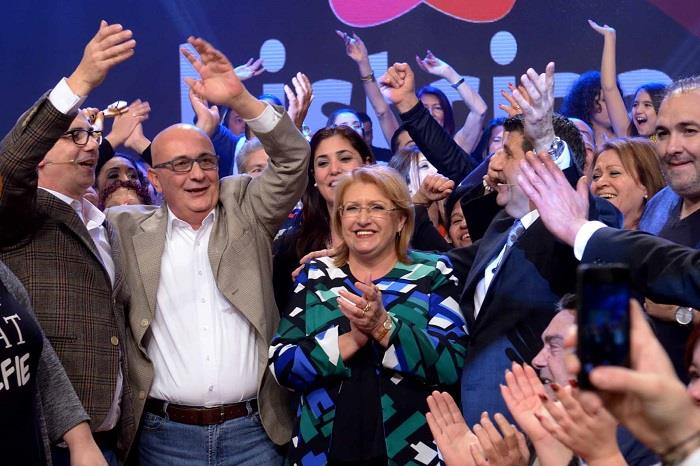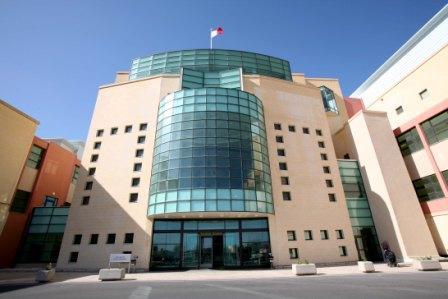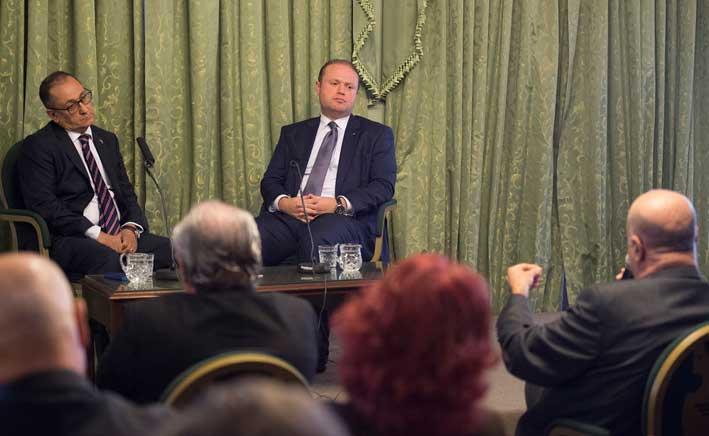Prime Minister Joseph Muscat this morning shunned another call by the Chamber of Commerce for further reductions in energy tariffs and defended the government’s policy on energy prices.
He was reacting to a speech by Chamber President Anton Borg who, during a consultation session this morning, insisted that the current tariffs reflected a time when the price of oil was over $100 per barrel. “The circumstances have now changed. This Tuesday, oil prices fell below the $30-per-barrel level and are predicted to continue to fall even lower. In our view the term ‘stability in prices’ needs to be redefined.”

Mr Borg noted that electricity typically represents around four percent of turnover or 12% of overhead costs in the manufacturing sector.
Replying, Dr Muscat said it would be easy for the government to peg everything with market prices but the country would return to “a bust scenario” once again when prices started rising again. “Our system guarantees stability,” Dr Muscat said, pointing out that energy prices for households were the third lowest in the EU.

The Prime Minister said, however, that more could be done to help businesses and the government was willing to do more. “We will not simply rest on our laurels. We are looking at other ideas while being responsible, factoring in the fact that there are 25 years of unpaid bills.”
The Chamber President also referred to the national health system which, he said, was unaffordable and does not adequately reach its objectives. “Besides, it does not give dignity to the patient in need.” Mr Borg said the President’s unrelenting efforts to raise money for life-saving treatment was testament to this. “It would seem that the annual financial requirements being catered for by the Malta Community Chest Fund are in the region of €4-€5 million. It would seem unreasonable to think that the country cannot find this amount of money to ensure better dignity for those in need.”

The Chamber’s proposals are based on applying the benefits of prevention is better than cure. If the country can at least afford widening the medicine formulary it would keep patients healthier and out of hospital beds. Mr Borg also called for the introduction of “phantom billing,” which would at least make patients aware of the cost the state is incurring for their treatment.
The Chamber President also spoke about the inconsistency in import regulations and abuse in free movement of goods. Besides constituting unfair competition this also results in huge tax leakages and unnecessary compromise on consumer health and safety.
Another subject broached by Mr Borg was the difficulty Chamber members were encountering when opening bank accounts for foreigners wishing to operate in Malta.

On the health sector, Dr Muscat said he disagreed with the Chamber President, insisting that healthcare could remain free “if the right business model was found.” Dr Muscat said the government was working on attracting foreign patients to Malta. “There is a huge potential but not enough support. My government is pursuing this strategy as we believe that if we manage to attract more foreigners to our hospitals this can pay for our national health service.”
Referring to out-of-stock medicines, Dr Muscat said the problem was “totally and solidly under control.” This was no miracle, he said, and the solutions were “no brainers.”

The Prime Minister said the government could not take the current economic success for granted and must look to the future. However Malta was going through a very positive time. “These economic successes started coming about in the past two and a half years thanks to the policy changes and critical reforms that we have implemented.”
Dr Muscat said the first two reforms were in the energy and labour market sectors. The next two would be Air Malta and healthcare.

The national airline had “tremendous potential,” Dr Muscat said. He warned that Air Malta had to survive in “the real economy,” not with the aid of subsidies. “There are several models we are looking at, including legacy and low-cost models. In the coming weeks we will conclude the first phase of the way we look at Air Malta.”
He stressed on the need for the airline to have a strategic partner, not just “people who pump money’ into it. “We have the potential to be at an unprecedented level of service with Air Malta within a couple of years,” Dr Muscat said.
Reacting to Mr Borg’s statement about banks, Dr Muscat said he was “very disappointed with some of the players in our financial system.” He said one particular bank had practically reneged on its role as a bank. “There is at least one player that can play a much larger role in the economy but has been on the backburner for a few years.”